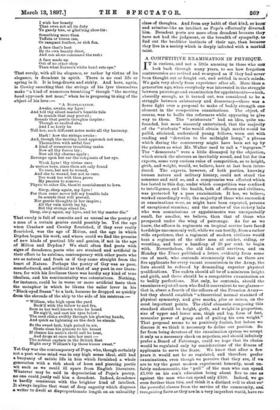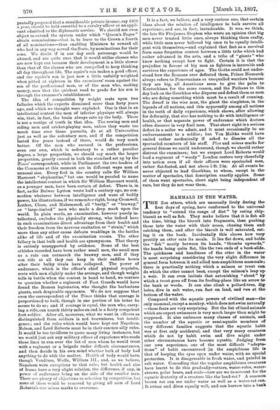A COMPETITIVE EXAMINATION IN PHYSIQUE.
IT is curious, and not a little amusing to those who eau look back through many years, to see how forgotten controversies are revived and re-argued as if they had never been thought out or fought out, and settled in men's minds.. We gain very slowly from experience after all. More than a. generation ago, when everybody was interested in the struggle between patronage and examination for appointments—which, absurdly enough, as it turned out, was considered to be s. struggle between aristocracy and democracy—there was a fierce fight over a proposal to make of bodily strength one element in the competitive examinations. The object, of course, was to baffle the reformers while appearing to give way to them. The " aristocrats" had an idea, quite un- founded, but most sincerely entertained, that the majority of the " students " who would obtain high marks would be pallid, etiolated, undersized young fellows, worn out with reading and "devotion to the midnight lamp," a phrase which during the controversy might have been set up by the printers as what Mr. Walter used to call a "logogram." The " democrats " were a little dismayed by the objection, which struck the electors as inevitably sound, and but for the experts, some very curious rules of competition, as to height, girth, and weight, would, we believe, have at last been intro- duced. The experts, however, of both parties, knowing human nature and military history, could not stand the nonsense and said so, and a compromise was effected which has lasted to this day, under which competition was confined to intelligence, and the health, both of officers and civilians, was protected by a pass examination. It has, we believe, worked exceedingly well; the majority of those who succeeded at examinations were, as might have been expected, persona of exceptional stamina ; and the number of the rickety lads who won commissions or appointments was unexpectedly small, far smaller, we believe, than that of those who prospered under the wing of patronage. As far as we know, the officers in regiments on tropical service have faced hardships uncommonly well, while we can testify, from a rather wide experience, that a regiment of modern civilians would beat a regiment of the older men at cricket, riding, or wrestling, and bear a handicap of 20 per cent. to begin with. Nevertheless, the old idea still survives, and on Monday the Times published a letter, evidently from some one of mark, who contends strenuously that as there are five applicants for every vacant commission in the Army, the lists should be reduced by demanding superior physical qualifications. The cadets should all be of a minimum height and girth, and there should be a competitive examination as to bodily perfections. Not only, he contends, should the examiners reject all men who find it convenient to use glasses— that is, about a fourth of the officers of the Prussian Army— but they should establish " a theoretical normal standard of physical symmetry, and give marks, plus or minus, on the most important points. The chief elements composing this standard should be height, girth, and weight in proportion, size of upper and lower arm, thigh and leg, form of feet, muscular power of grasp and of pulling his own weight." That proposal seems to us positively foolish, but before we discuss it we think it necessary to define our position. So far from being devotees of the examination system we accept it only as a necessary check on nepotism, and should infinitely prefer a Board of Patronage, could we hope that its choice would be regulated only by considerations of the fitness of applicants to serve the State. We know that after a few years it world not be so regulated, and therefore prefer examinations, even though we perceive that they are, if we are to try the great modern experiment honestly, most un- fairly undemocratic, the " pull " of the man who can spend 21,000 on his son's education being about five to one as against the man who can spend only £100. Indeed, we go even further than this, and think it a distinct evil to shut out the powerful classes from the service of the community, and recognising facts as they are in a very imperfect world, have re. peatedly proposed that a considerable private income, say £400 a year, should be held essential to a cavalry officer or an appli- cant admitted to the diplomatic service. We should not even object to extend the system under which "Queen's Pages" obtain commissions—that is, to leave to the Crown a fourth of all nominations—thus enabling Ministers to reward all who had in any way served the State, by nominations for their sons. We doubt if in our day such patronage would be abused, and are quite sure that it would utilise classes who are now kept out because their development is a little slower than that of the classes who are compelled to keep thinking all day throughout life. The squire's son makes a good officer, and the squire's son is just now a little unfairly weighted when pitted at eighteen in the examiners' room against the son of the professional man, or of the man who, making money, sees that the quickest road to grade for his son is through the crammer's establishment.
The idea of competition by weight rests upon two fallacies which the experts dismissed more than forty years ago, and which we thought were exploded. One is that in an intellectual contest the men of inferior physique will always win, that, in fact, the brain always eats up the body. There is not a vestige of truth in that idea. The rowing men and riding men and cricket-playing men, unless they waste too mach time over those pursuits, do at all Universities just as well as the sedentary men, and if the competition lasted five years instead of three, would do very much better. Of the men who succeed in the professions, even our own, which is sedentary to a rather peculiar degree, a large proportion, we should say much the larger proportion, greatly exceed in bulk the standard set up by the Times' correspondent, while in Parliament the two leaders of the Commons at this moment are in different ways men of unusual size. Every fool in the country calls Sir William Harcourt " elephantine," but one would be puzzled to name the intellectual contest in which Sir William Harcourt would, as a younger man, have been certain of defeat. There is, in fact, as Sir Bulwer Lytton wrote half a century ago, no con- nection whatever between intelligence and want of bodily power, his illustrations, if we remember right, being Cromwell, Luther, Cleon, and Mahommed, all "burly," or "brawny," or " large-limbed" men who made a deep mark upon the world. In plain words, no examination, however purely in- tellectual, excludes the physically strong, who indeed have in such examinations direct advantage from their health and their freedom from the nervous exaltation or "strain," which more than any other cause defeats weaklings in the battles alike of life and of the examination rooms. The other fallacy is that bulk and health are synonymous. That theory is entirely unsupported by evidence. Some of the best athletes recorded have been rather small men, the small men as a rule can outmarch the brawny men, and if they can ride at all they can keep in their saddles hours after their bulky rivals have collapsed. The power of endurance, which is the officer's chief physical requisite, rests with men slightly under the average, and though weight tells in battle when the contest is hand to hand, we venture to question whether a regiment of Foot Guards would have found the Roman legionaries, who thought the barbarians giants, such despicable opponents. We do not suppose that even the correspondent of the Times thinks that courage is proportioned to bulk, though in one portion of his letter he seems to do so; and if courage is equal, the man who, carry- ing a rifle, can march thirty miles on end is a fairly competent foot soldier. After all, moreover, what we want in officers as distinguished from soldiers is not brawniness, but intelli- gence ; and the rules which would have kept out Napoleon, Nelson, and Lord Roberts must be in their essence silly rules. It would be too invidious to quote many living instances, but we would just ask any military officer of experience who reads these lines to run over the list of men whom he would trust with a regiment or a brigade under difficult circumstances, and then decide in his own mind whether bulk of body bad anything to do with the matter. Health of body would have, though Vendome, Wolfe, William III , and, as we believe, Napoleon were exceptions to that rule; but health and size of frame have a very slight relation, the difference, if any, in power of endurance being on the side of the smaller men. There are plenty of objections to selection by competition, but none of them would be removed by giving all men of Lord Roberts's size minus marks to overcome. It is a fact, we believe, and a very curious one, that certain ideas about the relation of intelligence to bulk survive all experience, and are, in fact, ineradicable. It was, we think, the late Sir Fitzjames Stephen who wrote an opinion that big men never trusted little ones, always thinking them crafty, while little men never believed big ones to be equally intelli- gent with themselves,—and explained that fact as a survival from some forgotten contest between a little tribe which had rather advanced in the arts, and a tribe of "giants" who knew nothing except how to fight. Certain it is that the prejudice in favour of big men as fighters is incurable and survives the experience of ages. The Goths could not under- stand how the Romans ever defeated them, Prince Bismarck always refers to Pomeranians as unequalled warriors because- they are big, all Americans seem to give the palm to- Kentuckians for the same reason, and the Pathans to this day look on the Goorkhas who disperse and defeat them as men who are doing something which must be a result of cunning. The dwarf is the wise man, the giant the simpleton, in the legends of all nations, and this apparently among all nations in the teeth of daily experience, which shows, after allowing for deformity, that size has nothing to do with intelligence or health, or that separate power of endurance which doctors often discover in very frail men. That short sight is a serious. defect in a sailor we admit, and it must occasionally be an embarrassment to a soldier ; but Von Moltke would have smiled rather sardonically if asked to dismiss all the- spectacled members of his staff. Plus and minus marks for general fitness we could understand, though we should rather distrust the examiners; but we suspect Lord Roberts would, lead a regiment of " weedy" London costers very cheerfully into action even if all their officers were spectacled men, rather flat-footed, and not above 5 ft. 2 in. At all events he never objected to lead Goorkhas, to whom, except in the matter of spectacles, that description exactly applies. Some of them want spectacles, short sight being independent c race, but they do not wear them.



































 Previous page
Previous page